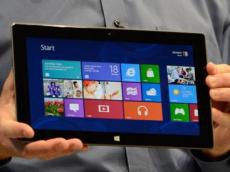|
|
TODAY.AZ / Weird / Interesting
Microsoft to challenge iPad mini
19 April 2013 [16:27] - TODAY.AZ

Microsoft is working with manufacturers to produce a line of small Windows-powered touchscreen devices to compete with fast-selling tablets such as the iPad Mini and Amazon Kindle Fire.
Peter Klein, Microsoft's chief financial officer, told investors and analysts on a conference call on Thursday that the new devices will be available in coming months at "competitive" prices.
Rumours that Microsoft would seek to compete in the fast-growing "mini-tablet" space have been growing over the past weeks.
Klein also hinted that an upcoming revision to Windows 8, codenamed "Blue" and due this year, will reinstate the "Start" button that has been familiar to Windows users since 1995. The changes will be partly due to "customer feedback", Klein said.
Earlier in April the research companies Gartner and IDC reported a slump in PC sales, with IDC blaming it in part on Windows 8 itself because it said the new interface was puzzling would-be buyers.
Yet Microsoft shrugged off a 14% slump in PC sales during the first quarter to report net income of $6.1bn (£3.9m), up 18% from $5.1bn a year ago, beating analysts' forecasts – though those had been trimmed last month in expectations that the poor computer shipments would have a deeper impact.
However the company did not release any figures for licence sales of Windows 8 – a figure that some had expected to hear. The last update on that came back in January, when it said it has sold 60m – though the majority of those would be to manufacturers who bundle Windows with new machines.
In adjusted figures, allowing for a $733m fine from the European Commission for briefly failing to offer a choice on browsers, and $1.1bn of "deferred" Windows revenue, overall revenues would have risen by 8%.
The "deferred revenue" came from a $15 upgrade offer to Windows 8 on Windows 7 PCs that were bought after 2 June: accounting rules meant Mcirosoft couldn't record the full value of those licences until the offers were either redeemed or expired. That meant that in the recent quarter it added that deferred revenue to its figures, for a huge boost.
At the company's largest division, Business, revenue rose 8% from a year ago to $6.3bn. The increase was 5% adjusting for upgrade offers for the new Office suite.
But the story for the Windows division would be less rosy. Including the deferrals, revenues rose from $4.63bn to $5.70bn, up 23%. But spreading the $1.1bn over the nine-month period since 2 June, and comparing it with the same period from 2011/12, revenues were up just 4% for a period including two quarters of the launch of a new version of Windows – usually a driver of growth.
Microsoft is trying to extend its software into smartphones and tablets as consumers turn away from PCs, the foundation of its empire. Over the winter, it launched two larger "convertibles" under the Surface brand, but sales so far have been slow, with analysts estimating the total at about 1.5m.
In October, the company took a large stake in Barnes & Noble's digital unit, which sells a line of entertainment-oriented tablets under the Nook brand.
Outside the Windows division, Microsoft posted solid results from its Office, software tools and Xbox divisions.
Even if the company has a lot of challenges, "there's a lot of good things going on at Microsoft," said Colin Gillis, an analyst at BGC Partners.
The company's shares rose $0.81, or 2.8%, to $29.60 in extended trading, after the release of the report.
Microsoft also said Klein is leaving at the end of the fiscal year, in June. He has been in his current role for four years and at the company for 11 years. The company plans to name a new chief financial officer in the next few weeks.
/The Guardian/
URL: http://www.today.az/news/interesting/121620.html
 Print version
Print version
Views: 1821
Connect with us. Get latest news and updates.
See Also
- 07 February 2026 [12:00]
Court allows Trump to detain immigrants without bond - 25 January 2026 [22:33]
Scientists solve 66 million-year-old mystery of how Earth’s greenhouse age ended - 20 January 2026 [14:34]
Spain train crash death toll rises to 41 after high-speed derailments - 19 February 2025 [22:20]
Visa and Mastercard can return to Russia, but with restrictions - 05 February 2025 [19:41]
Japan plans to negotiate with Trump to increase LNG imports from United States - 23 January 2025 [23:20]
Dubai once again named cleanest city in the world - 06 December 2024 [22:20]
Are scented candles harmful to health? - 23 November 2024 [14:11]
Magnitude 4.5 earthquake hits Azerbaijan's Lachin - 20 November 2024 [23:30]
Launch vehicle with prototype of Starship made its sixth test flight - 27 October 2024 [09:00]
Fuel prices expected to rise in Sweden
Most Popular
 The shameful finale of the banned "resident"
The shameful finale of the banned "resident"
 Azerbaijan has rewritten rules of transit in South Caucasus - which way will Armenia choose?
Azerbaijan has rewritten rules of transit in South Caucasus - which way will Armenia choose?
 Caspian at risk: Azerbaijan leads call for stronger regional cooperation
Caspian at risk: Azerbaijan leads call for stronger regional cooperation
 Armenia’s constitution: A fault line in peace process - Lessons from Munich
Armenia’s constitution: A fault line in peace process - Lessons from Munich
 Netanyahu’s office releases medical report regarding cancer rumors
Netanyahu’s office releases medical report regarding cancer rumors
 Canadian energy firm to launch oil exploration in northern Azerbaijan
Canadian energy firm to launch oil exploration in northern Azerbaijan
 Germany and France clash over fighter jet production
Germany and France clash over fighter jet production
